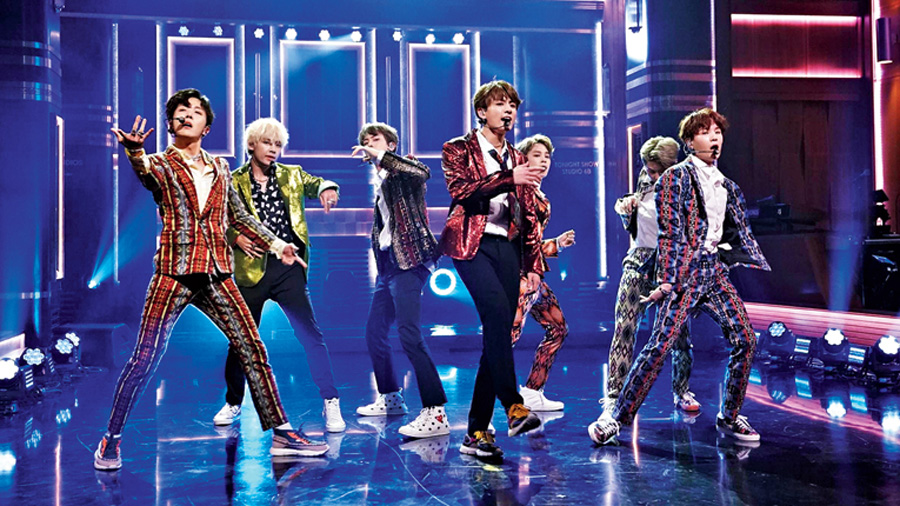It’s 10.30 on a Monday night, and Ashley Hackworth is putting the final touches on a personal project to make the world’s biggest boy band a little bit bigger. Hackworth, who teaches English in South Korea, is on a Zoom call with five other fans of the Korean pop group BTS, planning a virtual meet-up for followers. An online game for the event still needs work. Someone has to reach out to local radio stations about media coverage. And who can contact potential sponsors?
Their fan group will not be paid a dime for promoting the band. But without their efforts, and those of a vast network of other hyper-dedicated fans, the Korean company that manages BTS, Big Hit Entertainment, would not now be a multibillion-dollar enterprise.
Shares in the company have begun trading in South Korea, capping off the country’s most hotly anticipated initial public offering since 2017. Institutional and retail investors across the world scrambled to get a piece of Big Hit before the listing, with hundreds of pre-orders for every share. Big Hit, which reported a profit of $86 million last year, is valued at around $4 billion, after raising more than $800 million by offering investors about 20 per cent of the company.
Naturally, there are some concerns about an enterprise whose main product is a boy band — a creation not known for a long shelf life. For now, though, many investors see the listing as a golden opportunity, amid a global recession, to own a slice of a musical phenomenon that was the world’s most lucrative touring act last year and, by one estimate, adds more than $3.5 billion annually to South Korea’s economy.
But what these investors are really paying for is not necessarily Big Hit or even BTS. It’s a huge and highly connected ecosystem of fans like Hackworth with a deep, even life-changing, attachment to the group and its message of inclusivity and self-love.
‘We’re Army Incorporated’
BTS supporters, who call themselves the Army, don’t just attend concerts or buy the band’s seemingly endless stream of merchandise (although they do plenty of that). They have organised themselves into groups that perform a host of services on the band’s behalf, from translating a fire hose of BTS content into English and other languages (applications required, experience preferred) to paying for advertising and running highly coordinated social media campaigns.
Big Hit’s biannual corporate meetings receive millions of views online from hard-core fans, who scrutinise business strategy. And like any good company, the Army is obsessed with metrics: One Twitter account, @btsanalytics, which pumps out bone-dry data on album sales, YouTube views and music streaming numbers, has more than 2.5 million followers. Fans use the numbers to set, and follow through on, ambitious goals for BTS song and album releases — an approach intended to help the band climb the global charts.
Fans also look out for other fans. Lawyers educate followers about legal issues. Teachers offer tutoring. And as Big Hit’s IPO approached, those with investment backgrounds started online chat groups to counsel less financially savvy fans on the ins and outs of investing in the company.
“We’re Army Incorporated,” Hackworth, 30, said during a recent interview from her apartment, where the group’s posters and seven branded baseball caps, one for each member, decorated the walls. The fan group functions like any company, she joked, although “no one is in charge of us, really, and we don’t have a CEO unless you consider that BTS.”
The Army, whose name stands for Adorable Representative M.C. for Youth, is often depicted as a group of screaming teenage girls. The reality is different: While its demographics are hard to pin down — many members seem to be women in their 20s and 30s — the band’s fan base is broadly diverse, cutting across lines of gender, age, religion and nationality.
Compared with fan groups that have come before them, BTS’s followers are “so much savvier and strategic and smarter than what we’ve seen, especially in taking advantage of and utilising platforms like social media to really achieve their goals,” said Nicole Santero, a PhD student at the University of Nevada, Las Vegas, who has conducted extensive research on the Army.
BTS — whose name is an abbreviation of the Korean words Bangtan Sonyeondan, or Bulletproof Boy Scouts — has won a large following with its boyish good looks, slick dance moves and catchy music, spanning genres from rap to disco. But what fans really respond to is the band members’ carefully cultivated and inspirational story of fighting their way to the top of the music business while staying true to themselves, Santero said.
Their emotional openness and focus on mental health make fans “feel that BTS represents something that has impacted them and changed their lives, so supporting them is sort of their way of giving back to the group”, she said.
That devotion has allowed Big Hit to make BTS, which declined a request for an interview, into something more than just a band or even a brand. It is also a kind of lifestyle product, incorporating a dizzying array of content and merchandise, from variety shows to web comics, from video games to Korean-language courses. Its language textbooks are taught at Middlebury College and the Ecole Normale Superieure, one of France’s most prestigious graduate schools.
Dependence on BTS is investors’ biggest concern
One of Big Hit’s early innovations was to provide fans with hours of video showing the group’s members going about their daily lives — eating, working out and even just relaxing — creating an unusual level of intimacy with their followers.
Big Hit’s approach, which it describes as offering “music and artiste for healing”, has set it apart in an industry notorious for coldly rational business calculations and paternalistic treatment of artistes. Most of Big Hit’s Korean competitors build musical groups from the top down, recruiting thousands of trainees annually and spending years drilling them in singing, dancing and public comportment.
But Big Hit bet that fans would prefer human vulnerability to superficial polish. While the company is fiercely protective of BTS’s image, it describes itself as the group’s partner, and it has given the band members a degree of freedom uncommon in the world of corporate K-pop.
The Army has embraced the image projected by the company and its founder, Bang Si-hyuk, a long-time music producer who, in 2010, discovered BTS’s leader, RM, then a 16-year-old underground rapper, and built the group around him. Fans view Bang as a doting father figure who raised the men from obscurity and supports their interests, whether that means making albums with references to Carl Jung or starting an initiative to promote contemporary art.
In the lead-up to the IPO, Bang demonstrated his commitment to treating the BTS members as equals by giving them more than 478,000 of his own shares in the company. Army members applauded the move, although some questioned whether Bang — who holds 43 percent of the company and is set to be worth nearly $1.4 billion — should have given the men more.
He would do well to keep the group and its fans happy. BTS accounted for almost 88 per cent of the company’s sales in the first half of 2020, down from more than 97 percent during the same period the previous year.
That dependence on BTS is investors’ biggest concern. The normal worries that a company might have about any pop group — like the possibility of its breaking up or leaving the label — are exacerbated in South Korea by the country’s mandatory 18-month military service for men. Barring a change in the law or a deferment, BTS’s oldest member will have to report for duty as early as the end of next year, with the other members close behind.
Big Hit has tried to reduce those risks by diversifying. It now has five acts in addition to BTS. More important, it has positioned itself as a “content creator” in the vein of Disney, with BTS essentially playing the role of Mickey Mouse — a priceless intellectual property that can be spun off in almost limitless directions.
That means projects like the BTS Universe, a fantasy world populated by fictional versions of the band. The concept is similar to Disney’s approach to the Star Wars or Marvel Comics franchises, drawing fans into a constantly expanding cosmos of new content and merchandise that can eventually accommodate Big Hit’s other musical acts.
The company has also built its own social media platform, WeVerse, a commitment to digital content that is already paying off. Big Hit has increased its revenue sharply in 2020 even as the coronavirus forced BTS to cancel its sold-out world tour. Over the weekend, the group held a two-day online concert through WeVerse for which it sold nearly a million tickets, costing at least $43 each.
The concert rode the band’s success on the music charts. In early September, thanks to a push by the Army, BTS’s first English-language single, Dynamite, debuted at number one on Billboard’s Hot 100 — a first for a Korean pop group.
Laksmi Astari, 22, an Indonesian student majoring in fashion design at Sookmyung Women’s University in Seoul, is planning to pool money with her sister and a cousin to invest in Big Hit — her first time buying stock.
She is not overly concerned about potentially losing the money. She sees shares in the company as a kind of merchandise that might one day pay for itself.
“I get to invest in idols that I like, and it allows me to stay connected to BTS,” she said.
For Big Hit, a lot is riding on whether it can persuade fans like Astari to channel their enthusiasm toward the company’s other acts.
It might be a hard sell. Hackworth and the other members of her BTS fan group said that while they were enthusiastic about the prospects for Big Hit’s share offering, they were doubtful that lightning could strike twice.
“There’s no replication,” Hackworth said. “There’s just one BTS and one Army.”
The New York Times News Service











